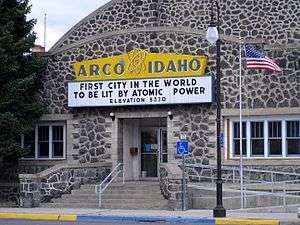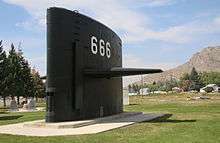Arco (Idaho)
Arco is a city in Central Idaho. In 1955 Arco became the first city on Earth to be solely lit by nuclear energy.
Understand

Main Street in Arco
Nearby Idaho National Laboratory, formerly known as National Reactor Testing Station and under various other names, is an important place for nuclear science and engineering development. Notable milestones are its first usable amount of electricity produced from nuclear power and the power plant for the world’s first nuclear submarine. The laboratory was also a place of the US's first nuclear accident with fatalities in 1961. The Stationary Low-Power Reactor Number One (SL-1), a US Army experimental nuclear power reactor, underwent a steam explosion and meltdown, killing three operators.
Get in
Get around
See

The Devil Boat
- 🌍 Experimental Breeder Reactor I (EBR-1) (18 miles SE along US-20). Open Memorial Day to Labor Day-9am to 5pm Daily. Take a self-guided tour through the first nuclear reactor to produce electrical power, first breeder reactor, and first reactor to use plutonium as fuel. Free.
- 🌍 Number Hill. The mountain towers above the city and the cliffs are covered with numbers. Since 1920 the graduates of the local high school paint the year on them. The locals try to fool the visitors by telling them the numbers correspond to high water marks of the Big Lost River.
- 🌍 USS Hawkbill (SSN-666) (The Devil Boat). USS Hawkbill with the "devil" hull number 666 was a nuclear-powered fast attack submarine. After the decomissioning in 2001, her sail was preserved and donated to Arco, the place where development of nuclear submarine propulsion began in nearby laboratories. It is on display in a little park along the main street.
Do
- 🌍 Idaho National Laboratory (20 miles SE along US-20), ☎ +1 208 526-0050. It is possible to arrange guided tours in advance.
Buy
Eat
- 🌍 Lost River Drive In, 520 W Grand Ave, ☎ +1 208-527-3158. A friendly diner with great food, especially the onion rings, among other "famous" sides. It also has great, amicable employees.
- 🌍 Pickle's Place, 440 S Front St., ☎ +1 208-527-9944, e-mail: jmdpickles@aol.com. Home of the Atomic Burger (not glowing, actually, served with onions, mushrooms and fried potatoes).
Drink
Sleep
Connect
Go next
- Craters of the Moon, spectacular lava fields, the youngest of which were spilled mere 2000 years ago - 18 miles SW along US-20.
| Routes through Arco |
| Boise ← Craters of the Moon ← | W |
→ Idaho Falls → Yellowstone N.P. |
| Boise ← Craters of the Moon ← | W |
→ Shelley → Idaho Falls |
| Salmon ← Challis ← | N |
→ Craters of the Moon → Twin Falls |
gollark: Definitely 96.
gollark: Nope.
gollark: No. 96 electromagnets, 200RF/t each...
gollark: It might be. I may have miscounted somewhere.
gollark: How much power does it produce?
This article is issued from Wikivoyage. The text is licensed under Creative Commons - Attribution - Sharealike. Additional terms may apply for the media files.